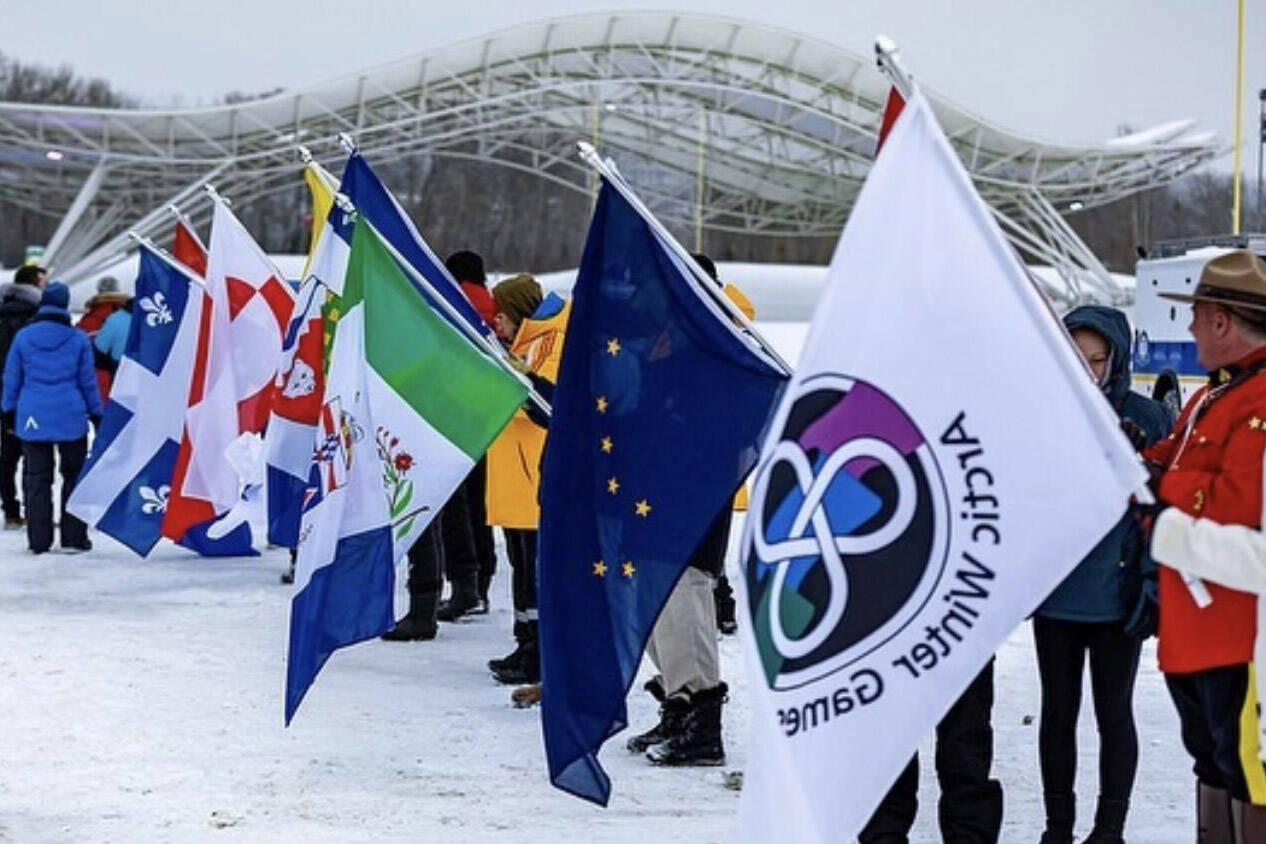Fifteen athletes represented the Kenai Peninsula in the 2023 Arctic Winter Games earlier this month as part of Team Alaska. The Games were held Jan. 29 through Feb. 4 in Wood Buffalo, in Alberta, Canada. Peninsula athletes competed in hockey, volleyball, cross-country skiing, wrestling, Dene Games and Arctic Sports.
Nine local athletes brought home Ulus, which were awarded in place of medals to the top three finishers in each event and age group. Age groups were determined by birth year.
Golds went to Leah Evans, of Homer, for the Dene Games’ 2005 or later girls triple jump, and Jess LeClair, of Soldotna, for both girls wrestling and Inuit wrestling in the 45 to 50 kilograms weight class.
Silvers were brought home by Brock Barth and Matfey Reutov, of Homer, who both were part of Team Alaska’s 2004 or later boys ice hockey team. Kenai’s Emma Beck landed a silver with Team Alaska’s 2004 or later girls volleyball team. Soldotna cross-country skier Ariana Cannava held up the second leg of Team Alaska’s silver-winning 2004-2006 3-by-3 kilometer relay. Ryan Glenzel, of Kenai, brought home a silver ulu in the men’s open snow snake, part of the Dene Games.
Charity and Eli Gordon, of Homer, both landed a bronze. Chastity claimed the bronze in the Dene Games’ 2005 or later girls 2-foot high kick, Eli in the Arctic Sports’ boys 2004 or later finger pull.
According to the Arctic Winter Games website, the Games’ purpose is to bring together athletes and communities from around the Arctic region to increase cultural awareness and understanding as well as to showcase the talent of their youth. Alaska joins the Yukon, Nunavik, Alberta North, Greenland, Nunavut and others.
The event is usually held every two years, hosted in a different location each time. In 2006, the Games were hosted in the Kenai Peninsula Borough.
The competition was canceled in 2020 and delayed from 2022 as a result of the COVID-19 pandemic. This year’s event in Wood Buffalo was the return of the Games. As a result of the delay, there won’t be a break year before the next games, held in 2024 in the Matanuska Valley.
“So much happened,” Cannava said Monday, of her experience. She said before competing in the Games, she hadn’t ever been outside the U.S. She said she didn’t know anyone else skiing for Team Alaska, who were mostly from Anchorage.
Despite that, Cannava said she quickly got to know her team, and quickly got up to speed. She said she performed even better than she was expecting.
Beck reported a similar experience. She said she was quickly thrust into competition with an unfamiliar team, featuring athletes from Valdez, Cordova and Fairbanks.
“We had an hour of practice as a whole entire team and then we were pretty much set out to try to win the gold,” she said.
Fortunately, Beck said she was “blessed” with a great team of girls.
“Everyone was willing to work together and figure out what we needed to do to win.”
Together, they ultimately landed the second-place finish.
Reutov said he felt like he was in the Olympics, describing an extravagant opening ceremony and attentive event staff.
Reutov was one of four Homer hockey players competing in the Games, and he also said he didn’t know most of his teammates going in, though he benefited from having a familiar face in Brock on his team.
“By the end of the trip, we’re all buddies,” he said.
“It was a great time,” Homer’s Zane Barth, Brock’s brother, said. He was part of a fifth-place finishing team in the 2007 or later boys ice hockey.
Zane similarly described a tight turnaround between arriving and diving into the action. He said he had one day to get prepared and acclimated to the time difference.
Kate Moseley, a Homer hockey player, competed in the 2003 or later age group, where her team landed fourth. She said she was nervous to compete on the larger stage with so many people.
She said she was quickly able to make friends and connections because the people around her all shared hockey in common. She said she found a lot of similarities between herself and athletes as far away as Greenland or Nunavut.
“We all do similar things,” Moseley said. “I was nervous because I didn’t know anyone there, but I ended up making a bunch of friends.”
Zane said he met people from all over the Arctic, talking a “bunch of hockey.” He said he met folks from Nunavut, the Yukon, even Norway and Finland.
Cannava said she had lots of time to connect with other teams as she waited for her ski events. Team Alaska and Team Alberta spent a lot of time together, leading to coaches referring to them as “Team Alabaska,” she said.
Beck said she spent time interacting with athletes from other areas — connecting over things like the difference between snowmachining and snowmobiling. She said she got really into pin trading, successfully collecting each set from each location.
Cannava, Moseley and Reutov all said they traded pins, jackets and equipment with other athletes.
Cannava said she “would love to” participate in the Arctic Winter Games again. That sentiment was echoed by Moseley, who already had her sights set on next year’s competition.
“I hope I can make it next year,” Zane said.
Reach reporter Jake Dye at jacob.dye@peninsulaclarion.com.


